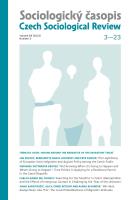Searching for the ‘Muslims’ in Czech Islamophobia and the Effects of Intergroup Contact in Challenging the ‘Fear of the Unknown’
Searching for the ‘Muslims’ in Czech Islamophobia and the Effects of Intergroup Contact in Challenging the ‘Fear of the Unknown’
Author(s): Carlos Gómez del TroncoSubject(s): Sociology, Migration Studies, Asylum, Refugees, Migration as Policy-fields
Published by: AV ČR - Akademie věd České republiky - Sociologický ústav
Keywords: Islamophobia; social cognition; intergroup contact; stereotypes; public opinion
Summary/Abstract: Since at least 2014, cross-national surveys have measured the most negative attitudes towards 'Muslims' in the EU among Czech respondents. These attitudes have often been attributed to few contact opportunities with actual Muslims in the country and, thus, public overreliance on the highly negative representations of 'Muslims' in public discourse. However, empirical qualitative assessments of the stereotypes which guide many Czechs' anti-Muslim prejudice and the effects of intergroup contact have been neglected. In an epistemological shortcoming, the survey category 'Muslim' has often been treated as one of analysis rather than of practice. Contrarily, I argue that Czech participants' contingent understandings and racialisation of the category need to be reclaimed as the ontological basis of prejudice. In this study, I relied on the results of a larger constructionist thematic analysis of 31 semi-structured interviews with non-Muslim Czechs and, regardless of citizenship or ethnicity, Muslims living in Czechia conducted in 2020 and 2021. The results show that, in line with public discourse dynamics, 'Muslims' in Czechia are commonly understood as immigrants racialised through their perceived Arabness, Middle Easternness and non-Whiteness. Furthermore, perceptions of Western European 'Muslims' as highly conflictual are juxtaposed with the fragility of Czechia in the face of immigration. Against this backdrop, I examine the mechanisms through which intergroup contact enriches participants' social cognitions of 'Muslims' - namely, subgrouping, positive stereotyping, reduced perceived intergroup threat and anxiety, and (re-)humanisation.
Journal: Sociologický časopis / Czech Sociological Review
- Issue Year: 59/2023
- Issue No: 3
- Page Range: 315-338
- Page Count: 24
- Language: English

